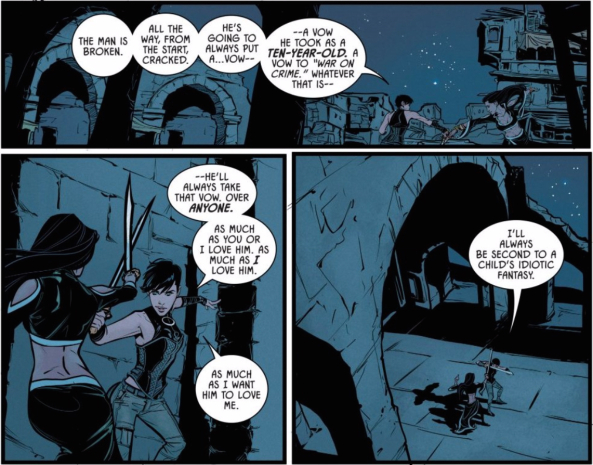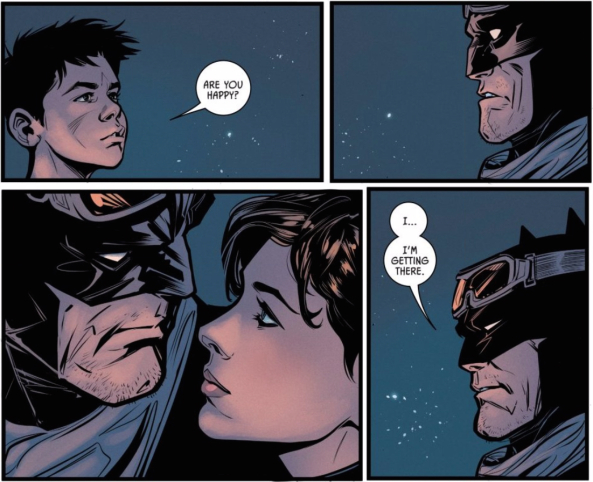by Drew Baumgartner

This article contains SPOILERS. If you haven’t read the issue yet, proceed at your own risk!

For all of the impossible technology, the men made out of shapeshifting clay, the resurrection pits, and the shark repellant, the biggest narrative conceit in any Batman story is the idea that an orphan’s single-minded decision to literally fight crime is somehow noble or laudable. For all of the attempts to “ground” Batman over the past few decades, from Batman: Year One to Christopher Nolan’s “Dark Knight” trilogy, none have deigned question that conceit. It’s too central to who Batman is — he arguably wouldn’t work without it. At least, questioning that conceit wouldn’t work with the kind of grim seriousness of those takes seem to take for granted with the character. By contrast, Tom King has always been willing to embrace the absurdity of Batman, the over-the-top everything that makes him fun, but with a self-awareness to admit that it’s also kind of silly. It’s long been the source of solid laughs for King’s run, but issue 35 hinges its most important emotional moments on that silliness.
Actually, we might do well to frame this issue as a kind of ideological clash between grim’n’gritty and light’n’silly. Talia fully buys into the seriousness of Batman, asserting that he may well be the greatest man on earth. Selina, on the other hand, fully recognizes the lie in Batman’s purported “greatness.”

To Selina, Bruce isn’t this mythological being whose origins we need to accept for the purposes of a narrative — he’s a real person with real flaws that she has a real relationship with. Or, as she so succinctly puts it “He’s just the stupid man I stupidly love.”
It’s a risky turn, calling out the conceit Batman’s seriousness is based upon, but it beautifully fits the tone of King’s run, finding new puchase on “realism” by pointing out the total unreality of it all. For me, though, the key moment of this issue lies in Selina’s triumph — both physical and ideological — over Talia. Talia accepts Selina’s truth because it’s a deeper, more profound truth — the kind that always existed beneath Talia’s but that was ignored in order to maintain the integrity of Batman’s mythos. King has peeled away that veil, making the idea of Batman at once more and less believable. Batman is still doing all the same absurd things he always had, we’re just now acknowledging their absurdity.
To drive that point home, King explicitly denies Batman the kind of pat happy ending we might expect of a superhero story. Or, at least, he complicates it a little:

Neither this relationship nor Selina’s defeat of Talia can heal Batman’s psychological wounds, but they can make positive changes in that direction. None of us can imagine what a truly healthy Batman might look like, but King acknowledges that marriage isn’t reserved for perfectly healthy people. Bruce and Selina have their own problems, to be sure, but they make each other happy. That’s a heck of a lot more believable than a dude resolving to punch away a city’s crime problem.

The conversation doesn’t stop there. What do you wanna talk about from this issue?
Advertisements Share this:




